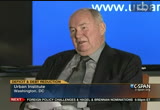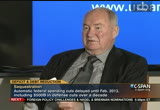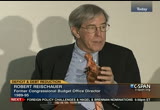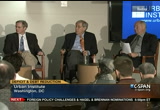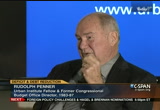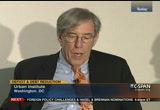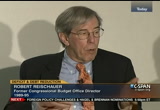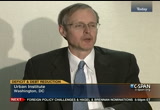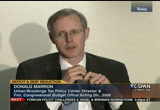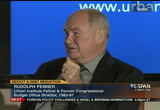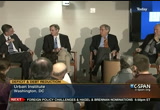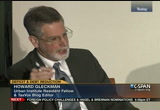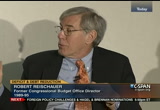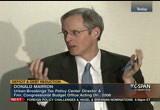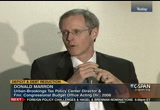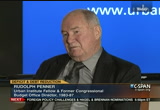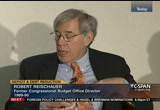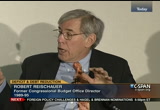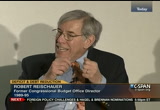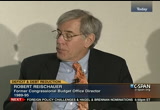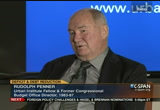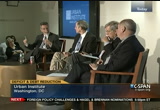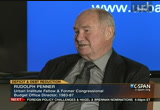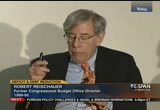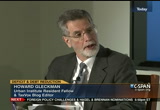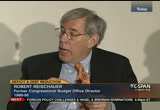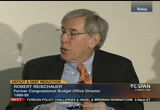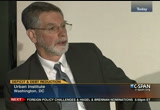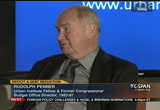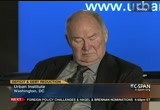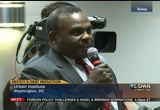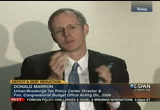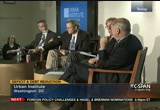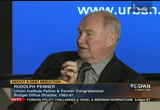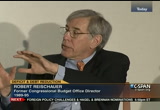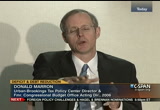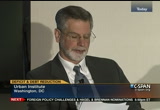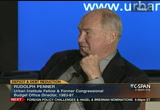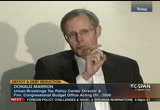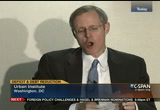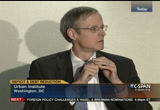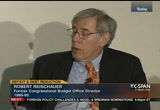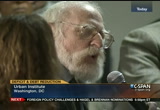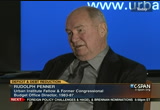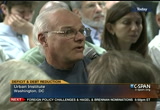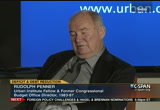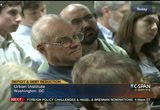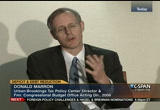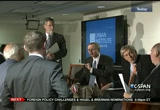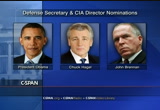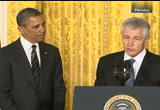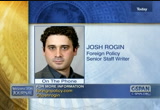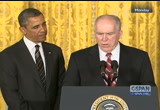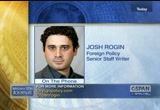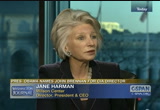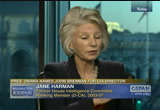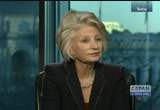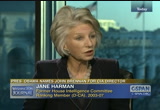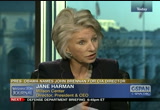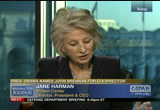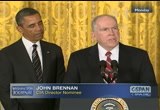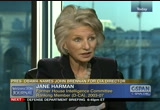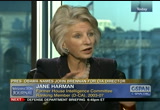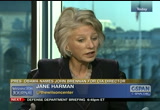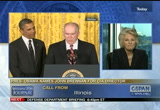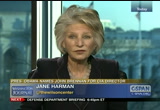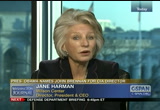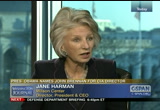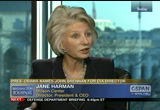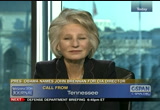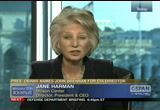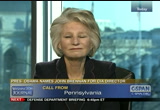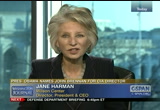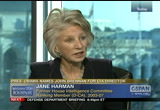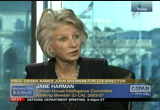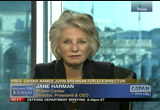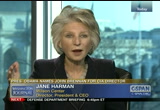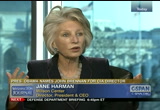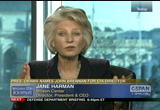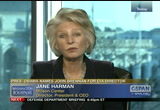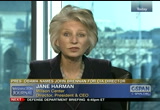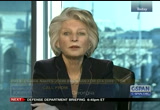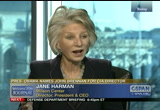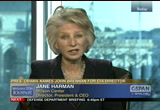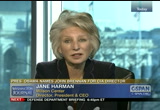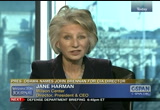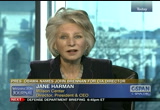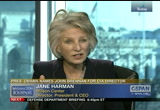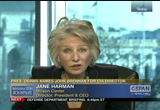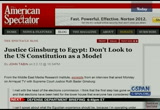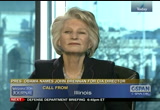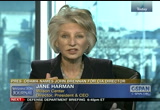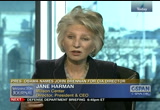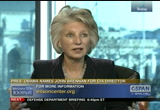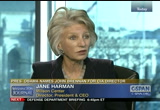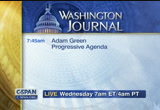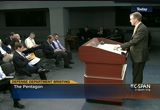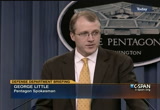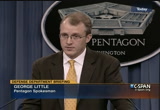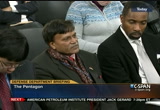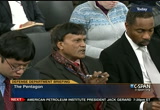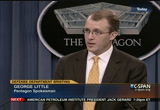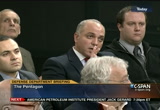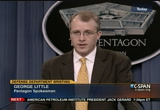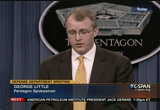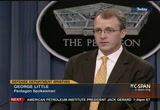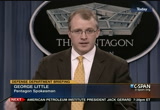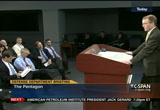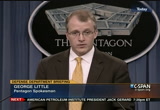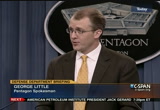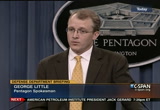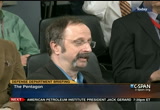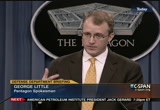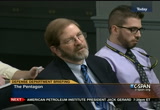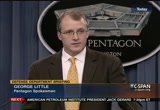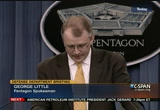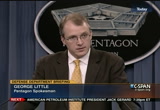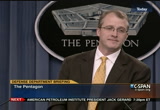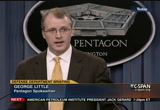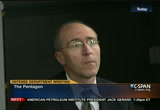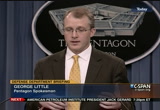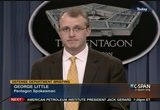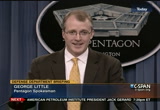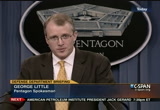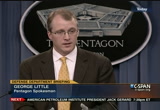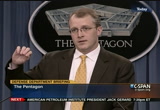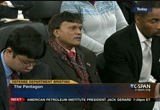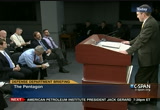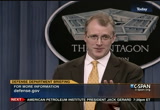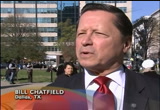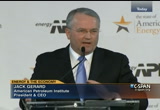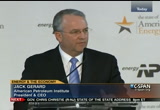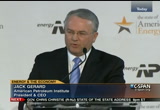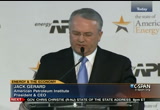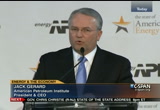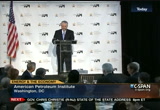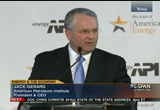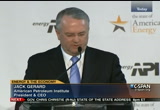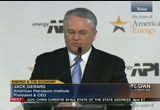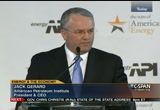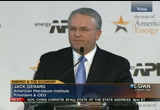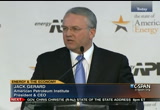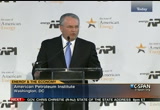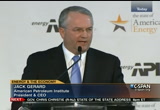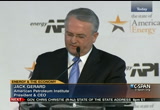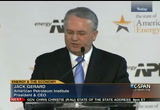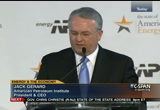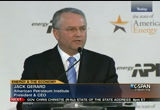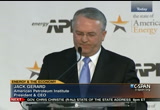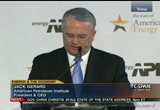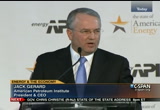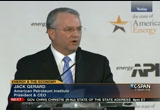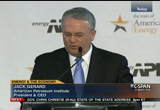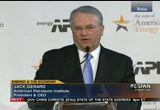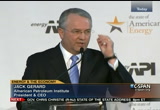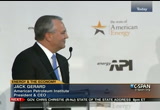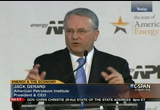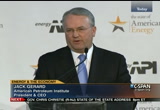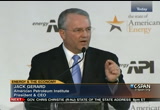tv Public Affairs CSPAN January 8, 2013 5:00pm-8:00pm EST
5:00 pm
of his students if he grades on a curve. >> i just wanted to say that in the good old days, which changed the tax law of got -- a lot, and we thought each change was permanent. in the good old days, i do have to admit that the system did not seem to be as completely broken as it is today. we have reduced the credibility of using something like a sequester, hard to come up with. in a sense, it would be nice if we had even more things expiring. i tend to favor not that. -- donald's view. it is good to get it off the table and not to have long debate every year.
5:01 pm
i am not as worried that makes a good deal of difference. >> but it is not hard for congress to patch amt. >> he is a good the. what he struggles over is do we have to pay for it. if we do not, how will we deal with our guilt? there are not a lot of people -- maybe there are. who sit around and worry about should we packed the alternative minimum tax or if we do, how will we construct the patch. -- construct the patch? the answer is the same as the last nine years. how do you allow yourself to do
5:02 pm
this? how do you come up with the money or the rest -- rationalization not to do this? >> we try all these budget processes. from my own perspective, one of the things we have learned over the last few years, we have tried all these budget processes, andnothing seems to work. a wonder -- given the fact that interest rates are-at the moment, there are not -- it does leave another pressure point. given the fact that interest rates are negative there is not much incentives for a politician to make the tough roads they need to make. the theme the absence will ever get washington? would a negative reaction finally get congress and the president to do what they're not willing to do? >> i was surprised during the
5:03 pm
debate that markets were so calm. i expected a lot more volatility. i am still scratching my head over why every little wiggle in the discussion of greece s sovereign debt seems to go up and down by the whole g.d.p. of greece. this much more pressing worry about the fiscal cliff did not seem to cause that much volatility. i suspect what the market learned from the 2011 so-called crisis is that congress will act to prevent the really great harm from being done at the very last minute. what that does it means that it is less probable as we approach the deficit and the other cliffs that the markets will pressure us into action.
5:04 pm
the interesting thing about sovereign debt crises is the markets tend to remain very calm until one day they don't. it is not a gradual process as neil ferguson has pointed out. -- niall ferguson has pointed out. these things are impossible to predict. they can be set on by a bit of bad budget news. >> ? -- bob? >> unlike greece and other countries, it is not that we do not have the financial ability to solve the problem. they do not. greece does not have debt. -- does not have that.
5:05 pm
we have the political will. -- we lack the political will. it is a different political situation. the other thing to keep in mind is we have not gotten the usual signal from bond markets are interest rates that you are living beyond your means. interest rates will go up. we have a weak economy. our fed has taken a set of policies for two years and now we're going to keep interest rates close to zero. that is a very unusual thing. it has eliminated one of the signals that the public and market and leaders look to for action. >> what do you think? >> the markets themselves are also telling us that interest
5:06 pm
rates are incredibly low because of the weak global economy. on the one hand i can talk about the u.s. financial fiscal crisis. on the other hand i do not feel in my heart, that the hypothetical fiscal crisis for the united states is still many years in the future. it is not something that is about to crop up on us now. the world is sending us a signal with incredibly low interest rates. that is making it easier for us to remain our relatively profitable status. -- relatively profligate ways.
5:07 pm
we have the power to get back on a trajectory that works. it is the usual thing of how you do hard things. in your personal life you know about the urgent pile and the important pile and the challenges you get caught up doing. the same thing happened at the federal level. the urgent stuff, the crises are what get attention. that is the way we haven't been in fiscal policy. -- we have been making fiscal policy. we do have moments when something gets addressed. we look forward to more support? it is giving me the political and cons addition we have. -- consolation that we huff. one of the things we should encourage is to show some leadership. now there are three more crises lined up. assuming we have survived
5:08 pm
though can also show some leadership, choose some new things we can attempt to do. tax reform would be a fine choice. >> the low interest rates are really important in depriving us of an important argument for getting the budget under control. i have always been fascinated by the fact that the canadians were able to turn the public a round from cheering on spending to really opposing any deficit. if you talk to canadian politicians and they say their single most effective argument was interest was taking 40% of their revenue. >> after he died he wanted to come back the incarnated as the bond market. that was clearly limiting what
5:09 pm
they thought they could do in terms of their policy agenda. there's no one in humanity that we like to be integrated as the bond market. >> let me ask you about tax reform. to any of you think that we could conceivably do tax reform with out an agreement first on how much money we think this new tax code needs to raise? does it even makes sense to try to do tax reform? >> by and large, no. the question is whether you can appeal of a piece being revenue neutral and what do you could move around the things people talk about. that is much harder to do in the words i just spoke.
5:10 pm
once you start doing fundamental tax reform it is virtually impossible to do without knowing. -- without knowing what revenue target you are trying to hit. >> what do you think? >> i think that is right. >> we could put it off the table. and we could agree on revenue numbers, which we do not think they are going to do. >> thank you. let me try to be a little optimistic about taxes if i can. during the presidential and fiscal cliff debate, there is a discussion about capping limited reductions. -- capping or limiting reductions. it seemed to get support from across the aisle. do you think there's anything to build on from that discussion? >> you don't want to start with someone who will be more optimistic? [laughter]
5:11 pm
my answer is no because the big bucks are the deduction exclusions that affect the middle class. they are very popular. everybody is foreign in abstract when you bring it from 3,000 feet to ground level, people want to bail out. housing prices are so far below where they were. we could send ourselves back into a recession if we did anything like this. there is all the complexity unless you went into a long phase which donalds had argued would be a good thing to do. i draw a parallel to 1983 and social security where we were in a crisis and we had to do
5:12 pm
something and with the most important things we did was raise the age of normal retirement. we got full benefit from 65 to 67. the first person affected was not affected for 17 years. i am all for that with respect to some of these exclusions to deductions. we do not have 17 years. >> what do you think? is there a way to build on with? >> if there were an agreement that we need to raise x amount of revenue or we were going to cut rates by y percent , going after the exclusion's deductions, politicians call them loopholes. that is in some sense of the
5:13 pm
best way to go about it. it sounds really good in the abstract. it becomes very hard to ask people to become increasingly aware of what that means. the the money is and help, mortgages, charity. people get very twitchy when you start raising those. there has been interest on both sides of the aisle. the president has a longstanding proposal to reduce the value of deductions and exclusions for high income folks. it is unclear the cut costs for high income. whatever that is. gov. mitt romney and others have capped deductions that would affect a whole range of taxpayers. that suggests there's interest there. when the pressure comes to find revenue from a pool that is where you go shopping. it is unclear with that pressure
5:14 pm
moves. >> i was concerned as to where the discussion was going when they were talking about $50,000 cap on deductions. i think true tax reform would involve getting rid of as many deductions as you could. i am not so naive as to believe you could get rid of them all. i think simpson-bowles and what i would consider their reasonable proposal did limit the value of the very sensitive ones. it was to a 28% credit. i did advocate getting rid of
5:15 pm
5:16 pm
goods the elderly purchase, in fact it is not very good. that index of inflation is slightly higher than the one we use now. even if this were policy debate in a seminar room in a university and you see what is the right thing to use to adjust benefits for the elderly and disabled, you probably would not go to a changed cpi. it would be a more accurate thing to do. stand back and look at this a different way. if we impose the changed cpi, benefits for the elderly and
5:17 pm
disabled over time would be slightly lower. who would they be most affecting? these are made to people's benefits. it may be 3/10 per benefit less. for someone who had been on tenure, the benefits would be 3% less. -- on 10 years, your benefit would be 3% last. if you say you want to cut benefits, which you say i want to affect at least those individuals who are not dependent on their social security benefits taxed they might be working part time. their pensions from other
5:18 pm
retirement income is at its greatest. you look at the person who is 85 or 86 and often, their pension was not indexed for their money. their spouse has passed away, they are, in general, tougher and -- financial circumstances. it is not that i would not have some sympathy for changing benefits, but i would like to do is lower the most for those who are most capable of withstanding the reduction. >> what do you say? >> i think the most important point to make about the change cb i is it saves you very little in the long run. it raises you very little on the tax side.
5:19 pm
if that's the only thing we are contemplating, i guess we talked about eligibility for medicare but we were not talking about sufficient reforms to fix the problem we face. while historically, the chain cpi may have gone up by two or three points less than the cpi w use, there is no guarantee. is just a forecast. -- that is just a forecast. we could save more or less depending on how things work out in terms of real reform, i would much rather look at something of this sort that bob discussed, some sort of progress of indexing approach to the
5:20 pm
problem. that would lower the rate of growth with real benefits at the top more than at the bottom. i emphasize or rate of growth because it the look of the bulls since the proposal, all benefits -- bowles-simpson's proposal, all benefits continue to rise in real terms even among the most affluent. we don't have to impose a huge amount of pain to resolve the social security question. >> let's say the best for last which is medicare. it was remarkable that during the entire fiscal cliff debate, the political system was silent on the issue of medicare. there was all this talk earlier by house republicans who voted for a dramatic change in the structure of medicare but during the fiscal cliff debate, over the last month or so, i heard almost no words about medicare. both parties seem to be terrified about even talking about it.
5:21 pm
what was going on? are there ways to get sufficient money from medicare to address the fiscal issue without entirely reforming the system that? >> it was evident what was going on. social security and medicare must be the two most politically popular programs ever invented. they affect a huge amount of people. it really is hard for politicians to attack those programs. i don't know what you do to make reform more acceptable. that is what i am so pessimistic for the long run. i think it will take some sort of crisis to get reforms and those popular programs. >> what do you think? are there ways to skin the medicare cat out committing political suicide? >> the president has proposed
5:22 pm
three-$400 billion over 10 years of additional adjustments to medicare, expending on some of the ideas of the affordable care act. -- expanding on some of the ideas in the affordable care act. a liberal organization has put out a plan of equal savings. there are ways to do this that don't constitute reform at large. -- writ large. the fact is that when we look at medicare, the growth of spending on a per beneficiary basis is going to be very low over the next 10 year because of changes that were made in the affordable care act. we are talking about growth rates that are half of what
5:23 pm
they have been historically. it is hard to see how you can squeeze more out of bad in the short run. in the longer run, i think fundamental reforms are possible but the president made this a defining issue in the election, that he was going to pass preserver medicare -- it was unrealistic to expect this would be front and center during the fiscal cliff negotiations. >> the president says he does not favor changing medicare but on the other hand, he says he favors increasing use of managed care. does that go to the same place from a different direction? -- from a different name? >> as you know, i have a certain track record with premium
5:24 pm
support which is actually a label that can of an article that henry aaron and i wrote in 1995. it was a very different approach, not moderately different, from what congressman ryan has pursued. i have a lot of sympathy for moving in that direction in a sensible kind of way and we already have the medicare advantage component of medicare. we are about -- about 1/4 of beneficiaries to to get their benefits through a plan offered by some private entity that agrees to take a risk-adjusted payment to cover medicare desk type benefits for people who enroll in it. motta fighting that program gradually -- modifying the program gradually over a decade i think would move you very close to something that congressman ryan would view as premium support.
5:25 pm
we're not going to get gobs of money out of it. the real issue is not medicare or even medicaid. it is the underlying growth in health expenditures per beneficiary in the system at large. those of us on medicare get their benefits from the same providers and through the same mechanisms that employer- sponsored insurance folks do you have to institute reform or changes in incentives that will lower the growth rate for all americans. that is the only way to be successful unless you think you will shift costs on to medicare beneficiaries and that has huge limitations because the average single person over 65 has median income of about $18,000. over half of the units, a 65-
5:26 pm
years old and older, are central as opposed to couples. -- single as opposed to couples. the couple's median income is only $44,000 so you cannot expect to get huge amounts of money by shifting costs on to them. >> i will give the audience a chance to ask a few questions. there will be microphones taken around and i would like you to wait until you get a microphone and please introduce yourself and make it a question and not a speech. right back here -- >> i am and dick miller -- what does anybody up there think about [inaudible]
5:27 pm
i understand the labels and expectations of having people in both houses of congress trying to work across the aisles, people in more of the middle. >> there are many bipartisan groups the deployed around. everyone on this panel has participated in some of them. do you see any opportunities at all coming from these? >> ultimately, it is the only way out what we see in the congress is continued polarization and erosion of the blue dog democrats, the moderate democrats and we see, unfortunately, more polarization on the part of the voters, too. that is exaggerated from the
5:28 pm
point of view of the house by the fact that we are so clever at drawing district lines that we tend to draw them around conservative and liberal bunches. when some congressperson seems to be acting out of the mainstream, he or she may be from the point of view of the nation as a whole but from the point of view of their constituents, they are just going along with public opinion. it is very difficult to break through that. >> gentleman in the back -- >> in reading one article, should you die in 2013, it said death taxes went up to 55%.
5:29 pm
-- went up 20% to 55%. i am very upset with that. y -- i can understand the president fighting with congress because you have campaign contributions and lobbyists. why is the corporate tax rate not on the table for discussion? all focuses on working folks and their exemptions and the mortgage and exemptions and also social programs but there is no focus or attacked or evaluation of corporate tax rates in this discussion or even with the congress. i already gave congress their excuse because of the lobbyists and paying contributions.
5:30 pm
>> one question is about the estate tax. maybe you can clarify what the rules are and the other is about the extenders which got extended. 1 to clarify the estate tax first? >> i will pass on the estate tax but i will focus on the corporate part. go back to the presidential campaign. you had one candidate, governor romney, who opposed lowering the -- proposed lowering the corporate tax rate from its current 35% some level down to 25 and the other candidate, president obama, the proposed to lower the top corporate racks rate to 25%. -- to 28%. it was a strong bipartisan effort in lowering the tax -- the corporate tax rate primarily because of reasons of international competitiveness. the united states is quite out of line with much of the rest of the world about what our tax rate is. on the other hand, we are also out of line on how generous our tax breaks are. what president obama has
5:31 pm
proposed in broad terms is a rolling back corporate tax breaks as a way to help pay for lowering the top rate. does -- it is something that dave camp and others have in congress have raised for their role is issues about how far we can go and rolling back tax breaks when companies and businesses know that what you are trying to do and different businesses have different opinions. the political discussion has primarily been a round revenue- neutral business or corporate tax reform in which rolling back the tax breaks would be a pay for to bring the top rate down. >> do you think there is a way we can do corporate reform in this environment? >> is extremely difficult but i think one really positive thing that came out of this fiscal
5:32 pm
debates this time is that for the first time in a long time, the business community unified around a concept of getting our deficit under control. they were not as worried about their individual tax breaks that might go as a result of having some reform. i hope that mood continues. that was a one group does not argue over one other or about accelerated depreciation and so forth. i am more hopeful that a more unified view from the business community is possible this time. >> i want to say one thing -- i'm not fully knowledgeable about this. i was at a meeting earlier today we're in noted tax expert
5:33 pm
said you cannot do corporate reform and not to individual reform because when we change the parameters, a whole lot of entities shifted from c corporations to other forms that were taxed on the individual side. if you lower rates on the corporate tax and get away with some of the preferences for oil and gas and various things, you'll get a huge shift of people out of the individual and into lower rates in the corporate world and you will lose money. >> this is a very important
5:34 pm
thing. watch as politicians talk about this and when they use the word corporate and when they use the word business. there are a lot of businesses that are structured as corporations and businesses that are structured as limited liability corporations or partnerships or s corporations and the taxation of their income happens through individual tax returns, not for corporate tax returns and some companies have a choice how i want to structure and a base that in part on tax considerations. there's also this issue that many of the tax breaks that applied to corporations are really business taxes. if you start changing those and make them less favorable as a way to raise money, you may also have the effect of raising taxes on the businesses that are taxed on the individual side that we might get the benefit of a corporate tax cuts. you would then run into fundamental economic issues if
5:35 pm
you are distorting how these companies choose to set themselves up and you begin to run political challenges that if your goal is to lower the corporate rate and paid for by rolling back business tax breaks, the bumper sticker of of what you just did is you have raised taxes on small businesses. there is a bunch of things that may not be true in what i just said that that is the bumper sticker that you are walking into. that starts to bring the pressure. once you are touching the individual side, you may have to go all the way to have reform. >> we have a question from one of our remote viewers. which kind of gets to the bottom line of taxes. let's talk about revenue as a share of gdp.
5:36 pm
how much could it believably collect in a new tax structure? can we agree? this is the issue before we discuss congress not being able to agree. rudy,what is a reasonable number? >> oh, dear - first of all, i think you have to separate the revenue target from how you face it. -- how you raise it. there are better ways to raise more money which would not be inefficient. i guess i felt pretty good about the kind of thing that bull's simpson was suggesting. -- bowles-simpson was suggesting. as i remember, it initially was $80 billion per year the. something like that. seemed quite reasonable. as we look forward, we will need more revenue than we have collected historical way as a% of gdp because of what the --
5:37 pm
collective historically as a percentage of gdp because of what the demographics are doing to a large part of government spending. somewhere around 22% or something like that seems a reasonable goal to me. >> i think that is a reasonable goal in the short term. if i were looking out into 2020, i think it will end up being hired. -- been higher. >> you tell me what the spending is and the percentage of gdp and i will tell you two percentage points less, maybe a little closer but people talk about balanced budgets. it is fun to talk about those. to get the debt on a trajectory where it stops growing faster than the economy, something like running 2% of gdp deficits on average would be a tremendous accomplishment relative to where we stand today. we will ultimately have to calibrate our tax revenue juxtaposed to spending.
5:38 pm
does not necessarily just a matter of rolling back tax breaks and the justing been known pieces of the tax code. thinking about things like carbon taxes and what not may be essential. >> they are applying spending in the 25% range? is that credible? >> we could design a tax system to support them. it is hard to skill what we have currently has an income tax to accomplish that. you would have to reduce deductions a lot. internationally, there are a bunch of countries that have
5:39 pm
larger governments than the united states. that has to do with financing and health care but some has to do with other things. if you compare their tax codes, on average, they choose tax consumption more heavily relative to income than we do. there are a lot of good economic reasons why tax consumption makes more sense than taxing income. it seems the political economic pressure is if you want to support a larger government, you have to have a more efficient tax system and that means getting rid of distortions and taxing consumption and relative terms and the u.s. would have to find a way to attack there. -- to get their. there is value added tax as a way to get there. i am firmly of the belief that we end up in a corbett -- carbon tax before we get to that. that is my political judgment. >> as somebody who designed a consumption tax once, do you think we are reaching the limits of the income tax?
5:40 pm
will we have to raise revenues somewhere else? >> i used to think that politics would push us in that direction. frankly, as hard as reforming the personal and corporate income tax is, coming up with a new tax at this point in time, i think, is totally unthinkable from the republican point of view. i cannot imagine doing it within the next 10 years or so. >> my observation is to not ask the question -- what percentage of gdp will total spending be -- what will happen to health care costs in the next decade and a half. if we get it under control, i think our numbers could be significantly lower. what we have seen over the last three or four years is very optimistic in the sense that health-care cost growth has slowed down.
5:41 pm
we have been there once before and it did not pan out. i am a believer that there are a number of forces that should make us more optimistic now than we were the last time this happened. >> other questions from the audience? it is on its way. hang on a second. >> i am mark gruenberg. the whole point of the fiscal cliff and trying to get the deficit down long-term -- you have not talked about the other obvious thing which is jobs. this is a tax panel but if you put people to work, they earn money, even at government jobs.
5:42 pm
if they earn money, they pay taxes, if they pay taxes, revenue goes up on the top -- and the deficit goes down. talk about jobs. >> talk about growing our way out of the deficit? >> everything you said is true. growth is beneficial but the net benefits are much lower than many people realize. the problem is that we have designed a system where we have, for example, indexed initial social security benefits to wages. that means that the faster the economy grows, the faster wages grow, the faster the cost of our promises of growth. with health, is more obscure but i think the evidence is fairly clear that people have more income, they demand more health care. as a result of that, if you grow faster, there will probably be more pressure on health-care costs.
5:43 pm
while growth has a net benefit, you cannot solve the budget problem with realistic rates of growth. we have to grow at chinese proportions to be able to do that. with what is possible in the united states, it would benefit and i don't want to deny that but we cannot grow our way out of this problem. >> another question from the audience? yes, sir >> thank you. we talked about how congress and we talked about the white house. what implications does fed policy have far -- for our economic future? >> mr. bernanke? let me put it this way -- i
5:44 pm
cannot believe that the quantitative easing we have had has done all that much good. i think the facts must be trivial on interest rates and the effects of liquidity i think are pretty trivial given that the banking system has been using their excess reserves. then't think it was worth risk of the exploding the fed balance sheet, a balance sheet that will have to shrink or the long run or else we do create the risk of more inflation. i wish the fed had not done all of that. i guess i am not as concerned as my people are that they will
5:45 pm
make a huge mistake as they begin to straighten out their balance sheet. it is hard to believe they can do it with precision to come to a perfect outcome. they are bound to make a mistake one way or another. making a mistake in a more contraction our direction is just as probable as doing it in an inflationary direction. the risks are there and i don't think the risks are high but i don't think it was worth doing what they have been doing. >> can lay on the wind it? >> i am a little bit more charitable. i agree that the impact has not been huge and i would not want to be ben bernanke's successor. [laughter] >> i will be the most positive.
5:46 pm
the risk profile is that it is much worse to do too little than too much. for idiosyncratic reasons in the middle of the financial crisis, the federal reserve got no -- new authority which is a new tool it has to combat inflationary pressures whenever that time comes. that time has not yet, when it does -- while they still have taken their balance sheets to unforeseen levels, i think the reality is that ben bernanke or his successor will be in a strong position to combat any inflationary pressures that may come down the road. are tepid recovery has been leading to the side of doing more. >> we will end on a relatively optimistic note. thank you very much to all. [applause]
5:47 pm
5:48 pm
>> tonight, new jersey gov. chris christie's annual state of the state address in trenton. he talks about hurricane sandy recovery efforts after congress approved insurance paid last week. and on c-span2, supporters and opponents of eminent domain discuss help to distressed homeowners. the event took place early today at the center of american progress, and you can see it at 8:00 p.m. eastern on c-span2. yesterday, president obama nominated chuck hagel as the defense secretary and john brennan as head of the cia.
5:49 pm
we will hear more on this as well as foriegn policy changes for the u.s. host: is on the phone with us. josh rogan, let's begin with the nomination of chuck hagel. " -- guest: they traveled to iraq together when president obama was just candidate barack obama. they have a similar world via. he has been serving as the -- on the intelligence advisory board code-share. they get along. he is likely to implement his policies. he has a great personal relationship with him. host: what about the confirmation process for the
5:50 pm
forming the senator -- for the former senator? there has been a vote count out there the right now there are senators that oppose him. guest: i would not trust any vote count. most senators lamont's commit before they have had a chance to properly is that the nomination. what we do know is there are about five senators who promised to vote no on his nomination. they are republicans, which is ironic because when he was in the senate he was a republican, but the party has moved away from the centrist approach to foreign policy. there is discussion whether that would be enough to scuttle his nomination. they are prepared to put a lot of political capital behind his nomination. usually when they do that, they
5:51 pm
are able to get the nomination through the process. host: we heard from senator john mccain. he put out a statement right away. tell us about that. guest: senator mccain is being cautious. he is concerned with some of the things he has done and said, especially concerning israel. he has previously called him a close personal friend. he is a vietnam veteran. they served together in the senate. they do know each other. there is a level of comedy and respect between senators. -- i do not think that john mccain knows what he is going to do. i think the hearings in congress and in the media will lead an impact on the final results. host: we are asking our viewers to tell us what they think are the foreign-policy challenges in
5:52 pm
2013. what does he face if he were to get the nomination? guest: he will have a range of foreign-policy challenges. we are talking about a military that is tired and worn out after more than 10 years of war. a state of fiscal challenges and austerity that is really unprecedented in american politics, which is put pressures on all of the budgets that he would have to be in charge of. we're talking about an arc of instability in the middle east, expecting it to get worse and worse, including libya, including egypt, including syria. if you want to go that far, we are talking about a world that is changing and is less responsive to u.s. pressure and u.s. military power and diplomacy, and that change is
5:53 pm
something that chuck hagel is aware of. at the heart of his idea is that the power should be placed in military centers around the world. the idea itself was controversial. it is a view barack obama agrees with and a lot of people in the senate do not. host: did an interview with the lincoln journal of nebraska and says that critics have distorted his view on iran at. guest: it is unusual for a nominee to give any interviews. but he wanted to get one opening salvo out there. he did one interview. he basically said he is being smeared, which is true. now he has a chance to correct the record in the confirmation
5:54 pm
hearing, but we should learn from that interview that he is not backing down from these assertions. he is not saying he no longer believes in the things he believed in that were so controversial. he is saying that they are being misrepresented. they are doubling down on those positions. that should make the confirmation fight even more exciting to watch. >> john brennan, let's talk about him. why was he selected to take over the cia? guest: general petraeus had to resign in degrees -- disgrace after having an affair with his biographer. what president obama did was search for the closest to him. president obama likes tim. -- likes him. he has been part of all the
5:55 pm
crucial counter-terror operations united states is been doing along the -- around the world. he is right in the middle of all the secret stuff that the cia is doing. host: what are issues that critics may have with him? guest: the drone program is the main one. the justification of gone into countries and killing people to a process that is just not transparent and with the accountability standards if you actually tried someone or use the military. it is a little bit more of a structure. that is one thing. the other thing is, overall, the role of the cia in fighting the war on terror is just not well understood.
5:56 pm
that is something that will be covered in these confirmation hearings. >> a cake, for john brennan, a foreign-policy challenges in 2013 -- are they the same? guest: largely, but the cia is going to be focused some places like yemen, libya. remember the u.s. attack -- i'm sorry, the terrorist attack on the u.s. mission in benghazi was largely an attack on the cia installation. they are a little more focused on the counter-terror mission, a little more focused on certain parts rather than others. yes, they are a more diverse world with more unknown threats better just harder to get a handle on and to combat in the world where the people we are fighting are just not wearing uniforms or marching in line and are not shooting at us in tanks.
5:57 pm
they are either doing terrorist attacks or cyber attacks, which are even more difficult to fight. host: thank you very much for your time. guest: sure, at any time. >> and now more on the nomination of john brennan for the head of the cia. host: we are back with former congresswoman jane harmon. served on the intelligence committee from 2003 until 2007. let's begin with the pick of john brennan. why do you think the president chose him? what does this job entail? guest: he has been in the catbird seat for four years. he was going to be the pick four years ago and his name was withdrawn at the last minute. as the guy in the white house, he managed our counter- terrorism program.
5:58 pm
he worked well with president obama. he is the guy obama trust most and this is a sensitive post at a very sensitive time. i think it is an extremely good appointment. host: what does the job entailed? guest: the director of the cia is different than what was before 2004. in 2004, four of us in congress, led the fight for intelligent reform and we've restructured our intelligence committee after the bad intelligence on iraq to have a joint commander. person is called the director of national intelligence. the current one is james clapper, a former three-star military man from the pentagon. under him are 16 intelligence agencies and the cia is one of those before that, the director of central intelligence had nominally have the coordination role.
5:59 pm
now, the cia is one of 16 but it is our primary spy agency. its role under the reorganization has become even more crucial. if you have seen "zero dark thirty," it shows the central the cia played in identifying the career and once we identified him, we found the house in about a block and then we found osama bin laden. host: senator john mccain said he wants to take a closer look at the interrogation policies of the bush administration and john brennan's involvement in that. guest: i applaud with john mccain said about interrogation. he has been saying for ever that torture does not work and he should know. he was in the hanoi hilton for
6:00 pm
so long and tortured by north vietnam during the war. he is right, in my view. i did serve on the intelligence committee for eight years. i was there in the 1990's and came back and was a ranking member. i think we should look at interrogation policies and look at detention policies and we should look at drone policies. before this nomination, john brennan asked to come to the wilson center which i now head, he asked to comment talk about the legal framework around drone policy. it should not be our foreign policy. it is a tool but many of our tools should be developed through prom -- diplomacy and soft power and john brennan understands this. one thing i hope he will do after he is confirmed, and i predict he will be, is take a fresh look at the cia mission,
6:01 pm
reduce the paramilitary part of that mission, that should be offloaded mostly to the pentagon with the exception of an intelligence function. -- the rest of the things the seat a dutch to be more conditional. host: are you talking about drones? guest: the cia has a huge role in our use of drones. it follows very careful legal steps. some can disagree and i disagree with portions of it but what i am saying is the role of the cia in executing drawn missions should be reduced. i think drawn missions over time to be reduced. the pentagon to be the place where military and paramilitary activities are launched and directed. the intel peace can happen at
6:02 pm
cia, at the operation of drones, it should move out of the cia and move to the pentagon. host: who makes the colonnade drone attack? guest: ultimately the president does. these are highly secret missions. a lot of the preparation happens at a lower level and the call about whether to use a drone in a particular strike happens a level below the president. i believe it is classified. host: what about foreign policy challenges in 2013 for john brennan if he become cia director? guest: the cia is not a foreign policy role. what the director and the agency is supposed to do is speak truth to power, collect information, predict information about the future. it is not a scientific agency. it is an analytic agency and
6:03 pm
they predicted agency so that policymakers can make the best decisions, something i used to say is that good intel will not guarantee right policy decision of a bad intel is more likely to feed a wrong policy. host: are talking with jane harman. former member of the intelligence committee. we will get to your phone calls in a minute but i want to get your reaction to what john brennan had to say when he came to the microphone yesterday about talking with congress. >> while the intelligence profession demands of secrecy, it is critically important that there be a full and open discourse on intelligence matters with the appropriate elected representatives of the american people.
6:04 pm
although i consider myself neither republican nor a democrat, very much look forward to working closely with those on both sides of the aisle. host: what did you hear there? guest: i heard a very important statement. during my eight years on the house intelligence committee, i was frustrated often by the lack of full information from our intelligence community to congress. congress is an independent branch of government. we are the ones who authorized legislation and appropriate funds and we need full information to do that adequately. we did not get it especially in the first half of the bush administration. we did get some information. i was in the so-called gang of eight. there was enormous frustration with the amount of information
6:05 pm
we got. john brennan understands that has to be corrected. it has improved over recent years. i think the current members of the house and senate intelligence committees will find a good partner in john brennan. going forward, if he decides to restore the cia mission to a more robust, non-power military mission, he will need the collaboration of congress. host: how so? guest: i don't know what he would propose but i think we need a new legal framework for these post-9/11 world. we have pieces of policies that are cobbled together -- the foreign intelligence surveillance act was updated, the patriot act is highly
6:06 pm
controversial and that was passed after 9/11 and has been amended since and some parts expire and some don't and it all sort of works but there is still serious issues about detention and interrogation policies. i strongly agree with john mccain about that there are other issues about how we do the intelligence mission now. we don't have enemies to wear uniforms, who attacked us in some symmetrical fashion on battlefields in nation states. we have rogue actors to act across borders. we have cyber attacks. have a series of different challenges. i think we need a new framework and i think john brennan, my guess is, will want to look at that. i have been a member of the cia and external board. if i continue in that position, i would want to contribute to a group that would try to think
6:07 pm
ahead on that. maybe it will need more legislation and john brennan would work closely with congress to get that host: here is your first phone call from chicago. caller: just touched on 2009 and it was controversial to have john brennan as cia director because he supported rendition and drones which were part of the radical bush administration programs that the democrats criticized at that time. now, obama has institutionalized of those programs. i am very concerned because there is no dissent on those issues. i have another question for you -- guest: the precise circumstances of john brennan's withdrawal -- i don't know them. i think they will come out in
6:08 pm
the confirmation hearings. the charges against him, some of them, from what i recall -- i think were not completely fair. you just heard me say that i think we need a clear legal framework around interrogation. congress has already banned torture which is something i supported and voted for. i think we could do an even better job there. as far as rendition, my understanding is that we don't do renditions. there was an article that i read recently in "the washington post" talked about the practice that i did not think conform to the old version of renditions. if there are things going on that can be discussed publicly about this subject, i'm sure they will be brought up in the confirmation hearings and it occurs to me that there may be a
6:09 pm
classified portion to those hearings. i don't know but i hope you will agree that some aspects of our intelligence mission must remain classified because sources and methods can be compromised. i think the legislative committees have a right to know about those things in the right way. i think putting all that in our newspapers and on the airwaves can get people killed and we have to be very careful. host: from twitter -- guest: i don't know. i think he is a capable man and has been the acting director. i interacted with him in my role as a member of the external committee of the cia. i think he was very gracious yester day when john brennan was nominated. that is not an easy thing to go through. i don't know what his position was on john brennan has been senior to him in the obama
6:10 pm
administration. he has the president's absolute trust. he is a very talented cia -- host: what you think the impact has been on the cia? guest: david petraeus is a genuine american hero. i do not condone what he did. the president had the right to accept his resignation. having anyone leave abruptly causes dislocation in an institution. he stepped into the shoes of the director and i think manage things very well. a lot of the policies started by david petraeus will be continued.
6:11 pm
one is to take a look at women in the cia. there was a committee that david petraeus started and it was under way when he resigned. host: that brings up a headline in "the washington post." guest: as i said numerous times, security is a women's issue. we are lionesses. we are well qualified to sit and any policy table anywhere. many women are. nobody missed the groundswell for the secretary of defense.
6:12 pm
there are lots of qualified women. four women head the 16 intelligence agencies now. there has never been a woman as head of the cia. i do not see a barrier that a woman cannot meet or overcome. i would hope that very soon we have a c.i.a. directer and woman secretary of defense. host: your name was floated for the post. guest: very flattering. john brennan is an obvious pick and i support him. i do not know how my name was put out there. i hope to play a role and support as we look at our
6:13 pm
intelligence mission and if he asks me as head of the nonpartisan wilson center, which focuses on aligning scholarships and policy. we are in a good position to marshal expertise. host: intelligence policy is our topic this morning. democrats, 202-585-3880. republicans, 202-585-3881. independents, 202-585-3882. james has been waiting. caller: thank you for taking my call. it is a strong delight to see you looking marvelous as ever. guest: you are just great, james.
6:14 pm
caller: i followed you i never it house hearing you participated in. you were just marvelous. there is no limit to your honesty. i am a proud vietnam veteran. i served when chuck hagel and his brother were there. what is it you can see that causes such a rift with the republicans went a democrat chooses a republican such as mr. chuck hagel. he has so much significant qualifications and knowledge of congress. that is the key thing. guest: i guess we'll see what the objections to a hagel are.
6:15 pm
i think hagel is a sound choice. i think the president has every right to nominate chuck hagel for this position. some statements he has made in the past need to be aired. my guess is that he will be confirmed by a large margin in the senate. the secretary of defense does not make foreign policy. the secretary of defense plays the primary role of bringing our defense department to bear to the service of the president. most people believe his qualifications are sound. he was a decorated hero,
6:16 pm
enlisted man in the vietnam war. there never has been an enlisted man like him as secretary of defense. the issues he is going to confront our budgetary issues and how well we can fund the pentagon and how we can cut back on certain aspects of the budget. that will be very tough. i agree with chuck hagel there are some things we can cut. we need to cut with a scalpel and not a sledgehammer. the threats against us are serious. we need to cut the legacy
6:17 pm
systems and put in more limited amount of funds in the right places so we can protect our country. host: we will talk about the pentagon budget and what they faced with these spending cuts as well as the secretary of defense chuck hagel and his thoughts about the pentagon. bobbie is next, republican caller. are you with us? caller: good morning. i like to welcome the guest. thank you for the opportunity. your guest was in a legal turmoil about representing, was
6:18 pm
scored on a wiretap with two agents that were caught spying on america. that is all i have to say. guest: that was report it six years ago and reported again in 2009. it was a political smear. i have it in writing that i was never the target of any investigation. unfortunately, these days people who do not wish you full success are able to make charges and sometimes those charges have a shelf life. if you haven't brought it up, i would guess nobody else would have remembered it. i'm happy for the opportunity to
6:19 pm
respond to you. host: this comes from twitter. guest: the answer to that is yes. if they fit the definition of covert action, they have to be disclosed to the so-called gang of eight. the gang of eight is the leaders of congress, minority and majority leader's. i was in that group from 2003-2006, which was a turbulent period for us. this letter was
6:20 pm
declassified. i wrote a letter commenting on so-called enhanced interrogation techniques in which i was briefed and asking the general counsel to the cia for what was the policy guidance that he had when we were all very scared about the future of the country. i told the cia not to destroy any videotapes that i had heard had made of these techniques. the videotapes were destroyed. host: hi, dan. caller: hi. in regards to some terminology that she has used several times this morning.
6:21 pm
legal framework. that sounds kind of vague. i wonder if jane can be a little more specific about what she means. as the law is constructed, are there some restraints that she does not like that she would like to see changes? i do not know why she wants a new legal framework. maybe so different agencies can interact differently. guest: thank you for that question. i have been a little vague. i would like to explain that better. our constitution provides that
6:22 pm
in order to surveil a person, an american, you need an individualized warrant. otherwise you're doing and unconstitutional search or seizure. if we intercept messages are get meta data, what and perhaps some of those involved communications, what are the obligations to make sure we know if it is an american and that we have the right permissions if we go further.
6:23 pm
that was what congress struggled with when it amended the surveillance act in few years ago. i think we got it pretty much right. we have a system. meta data is ok. there are -- communications are different. i would like all the policies to hang together -- how we detain people and learn about their communications with other people, how long we can preserve data is another issue. policy has been changed to lengthen it.
6:24 pm
i think that could use more public scrutiny. put it all together. this is the 21st century version of a set of u.s. laws that comply with our constitution that we can explain to the world. why is all this important? the way we will win against this challenge of terror is to win the argument. we have to explain ourselves. one of our values is abiding by the rule of law. we have to be able to explain our laws. doing this will help us conduct
6:25 pm
ourselves better and will help us win the argument with others who may try to blow up themselves and innocent people, or whether they should join society and may be hope for a better world. maybe even some day come here and enjoy the freedoms that the rest of us enjoy. host: tj on twitter says -- hillary clinton will testify about this before she steps down from that post. guest: i think the senate has every right to demand -- to expect people to testify about what they know a lot lessons they are learning from this. it was a horrible tragedy. there is no such thing as 100% security.
6:26 pm
some diplomats will be in harm's way from time to time. nobody is defending the policies we had around benghazi. hillary clinton looked great yesterday. i hope she is well. i think she will testify. we will learn what she knew and what she thinks. the state department's has taken a set of corrective steps. we will do better in the future. host: were showing pictures of her meeting yesterday when she received a helmet from her staff and a football jersey with the number 112, the number of
6:27 pm
countries she has visited. guest: it is astounding. punishing schedule. no sleep. eating on airlines. not enough exercise. are you listening to me? host: thank you for waiting. caller: how john brennan plan don meeting the perceived asian tilt. how the cia plans on tackling that. guest: the cia does not make foreign policy.
6:28 pm
to focus on a failed state where we have reason to believe that a loss of terror organizations are training. these are important things to do. the cia's role is to provide intelligence on these parts of the world and not to make policy. i'm betting that too much of our intelligence is tackle. it is focused on who is coming over the next hill in the battlefield. most of our intel assets into afghanistan and iraq. it is a good idea to restore some of our focus in other parts of the world, including asia.
6:29 pm
as a former policy maker, i would hope this rebalance toward asia will not focus on how we make relationships with china and others more difficult. i would hope it would help to join in the region to create a larger trading relationship and to better understand ways in which we can become close friends with china. i think that will be in everybody's interest and gives us information about leadership changes. better information about other trends will be better and more congruent. host: we have about 10 minutes
6:30 pm
left with jane harman. now the director of the wilson center. linda from new york is next. caller: good morning. i have a three-part question for jane. changes would you like to see made to our constitution? guest: i'm not recommending any. i would like the equal rights amendment at some time. host: are you there? caller: what should be the response of americans to the
6:31 pm
supreme court justice ginsburg's ripping of the constitution saying it is old and no longer relevant? should he be removed from the bench? guest: i'm not sure i understand that. ruth bader ginsburg is a conscientious woman. if you are talking about the egyptian constitution, that is up to them. there are some issues about that constitution. some of that phrasing is vague. i'm interested in the transition. i have urged both sides to
6:32 pm
improve their political skills so they can deal with each other better and make some compromise. i would offer that same advice to the united states congress. caller: you did not answer my question and you took a lot of time sidelining my question. which begun about ginsburg's prepping of our constitution to the egyptians? she said it is old and no longer relevant. guest: i misunderstood your question. i don't recall that statement by ruth bader ginsberg. times the constitution is
6:33 pm
interpreted in ways i do not agree with. her comments were of a more generalized nature, so be it. i am surprised to hear her say we should rip up the constitution. i think our constitution is an impressive document. host: this is from twitter. guest: dod does execute some drone strikes. there are two statutes. they work more or less together. operate this way. we have had a cia director who became the secretary of defense.
6:34 pm
we had a military leader in defense who became cia director. it is time to take a look. this is an easy policy change. look at what the cia has become. the paramilitary missions of the cia should be reduced substantially. the drone function become much more centered in the department of defense. the cia go ahead to a more varied mission calls on some of its old traditions -- human spies, taking longer looks around the world. john brennan asked to come to the wilson center and talk about legal limits around our drone
6:35 pm
program. he has said a drone-centric farm policy is not effective. i agree with that. we need other tools. diplomacy is crucial which needs to bidding amped up. host: our producer found this story about justice ginsberg. excerpts from an interview that she had done. she calls the u.s. constitution -- she says we have the oldest constitution in the world. she says she might look at the constitution of south africa if you were drafting a constitution in 2012. guest: oh.
6:36 pm
host: hi, ralph. question or comment? caller: question has to do with the multiplicity of the intelligence agencies that we have in the united states. think there are 11 or 13 of them. it seems to be ridiculous. the idea of the dni and relegating the cia to second place. i'm not sure what the dni does. it seems to be duplication. nobody seems to be talking about these centers. they are hiring legions of people and we do not know what
6:37 pm
they are doing. nothing is said about it. guest: we have a lot of intelligence agencies. our intelligence leading up to the war in iraq was bad and it was bad for a variety of reasons. we had a source we never directly interviewed. there were clues in the fbi. the fbi did not talk to the cia. we came up with a model that fixed the pentagon. the pentagon used to have the
6:38 pm
services staffing and fighting separate wars. they would equip themselves separately. we decided to do what the military did. a joint command was created. he can come from any military service. they now trained and equipped to gather. -- togetherthe dni is the joint commander across 16 intel agencies. he leverage is their strength to produce intel products. that is the backbone of how we get intelligence to policy makers and that has dramatically improved.
6:39 pm
on the fusion centers, that is a different thing. those are local centers that have gone up to serve local law enforcement. they pull together national intelligence streams that they get from the homeland security department or the fbi with streams of local intelligence and a share it. the homelands department has tried to insist on privacy in these agencies and provide some financial support. this is a work in progress. some of them worked very well. one in los angeles works very well. other communities, maybe not so good. we will work on that. host: a final question for you.
6:40 pm
do you think john brennan gets confirmed? guest: i think they both should be confirmed. ssurely john kerry. i think they should be asked vigorous questions in their confirmation hearings. that is the prerogative of the senate. this is a democracy. some people will vote against them. they have a right to vote against them and their constituents can decide if they made the right decision or not. the president should be entitled to his nominees. he is our president and was elected by a substantial margin. these are qualified people. after they are subjected to scrutiny, it will be able to explain themselves and serve our country well.
6:41 pm
we can assemble a good amount of series focused and the like to help or offer to succeed in the next four years. host: might you consider a post in the second obama administration? guest: i am happy with the job that i have. if asked to continue to serve, i will continue to serve. host: thank you so much for spending some time. >> wednesday on "washington journal." adam green of the progressive agenda committee. while they are hoping the 113th congress will shift to the left. and upcoming budget battles
6:42 pm
between president obama and the 113th congress. plus, your e-mails, phone calls, and tweets. "washington journal" live tomorrow morning at 7:00 eastern on c-span. tonight, new jersey's governor state address. he talks about hurricane sandy recovery efforts after congress approved aid last week. see his t governor's speech at 8:00 eastern here on c-span. a debate on how to help distressed homeowners. that is when the government buys homes and sells them back to the owners at a lower price. you can see it at 8:00 eastern
6:43 pm
on c-span2. pentagon spokesman george little held a press conference today. he announced details about hamid karzai's visit. reporters asked about president obama's national security nominations. the defense department, budget, and sequestration. this is 35 minutes. >> good afternoon, everyone and happy new year. like to take this opportunity to provide a preview of the next few weeks here at the pentagon. tomorrow evening, panetta will continue con taugses on israeli defense administration. we will welcome hamid karzai to the pentagon president karzai
6:44 pm
will receive a full honors welcome. the secretary and president karzai will visit the 9/11 memorial who remember the people who lost their lives when al qaeda attacked the united states. secretary panetta will participate in meetings with president karzai at the white house. this provides the opportunity to discuss the ongoing transition and our commitment to afghanistan following transition at the end of 2014. looking to next week, on monday, secretary panetta will department for a week-long trip to europe. it will take him to spain, italy, and the united kingdom. this provides an opportunity to meet with allies and discussion the mission in afghanistan. these nations combined have provided thousands of troops to
6:45 pm
the mission in afghanistan. secretary panetta looks forward to meeting with these counterparts in each of these countries. the secretary's strong support for the president's nominee to be the 24th secretary of defense. as is customary secretary panetta has a joint transmission team that will provide support. senator hagel will receive information on budget. >> do you have any readouts on the dinner between panetta and hagel last night? >> it occurred last night at the pentagon and it was on one-on-one dinner. it with was a good discussion. so it was more midwestern themed
6:46 pm
dinner with a little steak and corn then italian this go round. >> i don't know if there was wine. >> housekeeping on the karzai visit on thirs, will they hold a joint press availability? will we get any information? >> we will, of course, provide a readout with the meeting with president karzai but at this point there is no joint press availability. this is a head of state visit and more details will follow from the white house on the visit. that being said, the secretary and chairman do plan to have press availability on thursday afternoon. >> what is happening at the
6:47 pm
india and pakistan border? this time it is kind of a serious matter took place and fightings are happening at the border. according to -- [indiscernible] with president karzai coming here and things going on in washington and what is happening in afghanistan. what if india -- it might be hurting inya. >> well, the issue of tensions between india and pakistan is something that the secretary knows very well.
6:48 pm
we all hope that we can maintain peace and stability in the region. the secretary has affirmed that on visits throughout that region including to india. on tissue of terrorism, let me say that we stand with everyone in the world to include those in india and pakistan who take a hard line against terrorists who want to kill civilians whether they are pakistani, indian or american civilians. we believe there needs to be a united front against terrorist groups operating in that part of the world and others. >> as transition to what is the last time that the secretary had been asked by yained of any kind of help -- are they going to talk to anybody? >> the department has had regular dialogue.
6:49 pm
secretary carter has been asked to take on the role of looking at how we might be able to facilitate transfers more effectively with the government of india and that process is ongoing. >> what is the situation right now in regards to syria's nuclear weapons? does assad have the intention to use those weapons? do you think the visit to the pentagon is to discuss the this topic, this issue? >> the secretary panetta and him have met on a number of occasions. i'm sure the talk of syria will come up. to your question on chemical weapons, without get together deep in intelligence i'm unaware of any information that the
6:50 pm
syrians are planning to use the chemical weapons. let me be very clear, this government would view that kind of actions a a red line. officials have been clear about that. we will continue to do so. the assad regime and it continues to perpetrate violence against its own people, it is unacceptable and it is time for the assad regime to go. but in the meantime, they have a serious responsibility to maintain security over their chemical weapons and not to use them. >> so you believe that the syrian chemical weapons are in good hands, are safe so far? >> the syrian regime has an obligation to maintain security over the syrian chemical weapons
6:51 pm
stockpiles. i have not heard of change in the secretary's assessment. >> there has been a lot of reports, discussion -- including reports to them having heavy equipment to dig in in desert wars and eastern places. there is reports about the us and france and some other countries making some plans to do some kind of military operation. what can you say about what the pentagon is planning or doing, not just in terms of bali but in terms of extremists? >> i'm not going to gets into specifics on operations but we understand the serious threat that terrorist groups pose in north africa. we're working closely with our partners in the region to try to
6:52 pm
find a way to authority their activities. the united states is committed to going after terrorists no matter where they might be to protect american's interests and our partners and all lies around the world. >> there was some reports about -- is there -- do we know what the situation is with that? >> in mali or elsewhere? >> in africa specifically. >> we have different relationships in africa that we, of course, look to and value. we do in some cases provide training support to militaries on the continent. it is an important part of the world for a number of reasons.
6:53 pm
mike? >> i think i missed it but where are we with general john allen? has the report been completed? >> i don't have an update on the investigation but the secretary and general allen had a very good discussion this morning on the situation in afghanistan. they have a weekly conversation. the secretary believes that general allen does an effective job in prosecuting our efforts there to transition and prosecuting the war effort. substantial effort has been made on his watch but i don't have an update on his process. >> by the end of the week will the secretary give the president
6:54 pm
his final recommendations on 2014 options? will those likely be discussed with president karzai this week? >> well, it wonet surprise you that i gonet into the private consultations that we're having with the white house on specifics on troop numbers beyond 2014 or the draw dawn between now and 2014. the process is ongoing. ultimately, it is the president's decision. with respect to consultations with president karzai, we believe on thursday the secretary and president karzai will have a good discussion on a broad range of issues. i remind you it is not just about troop numbers but it is also about the by lateral agreement -- bilateral agreement and we think there will be be a productive decision and both
6:55 pm
sides work very hard for this visit and we look forward to it. >> at a time when 800,000 civilian temp pleas -- what is the justification taking him and his entourage spending millions of dollars to go to the curbiest capitols in the world? why can't this be done by v.t.c.? what is in rome that the secretary wants to see? can you justify this a little bit more? >> the secretary of defense wants to see strong nato allies who have fought and died in afghanistan. he wants to see our foreign counterparts to reaffirm our strong commitment to transatlantic defense alliances. this is a trip that is about trying to drive even deep relationships with close allies.
6:56 pm
there is a lot of work to be done with our european allies and i will remind you, this is his first major swing through the capitols. the secretary of defense has not been to london, he has nod been to madrid. all four of those counterparts have visited the united states. this he's been to nato and the security conference. he made several trips to asia at this stage eastern parts of the world but this is his first swing through europe. >> but the optics don't look great since we have sequestration hanging over. it looks like a farewell junket basically. >> that is your characteristic. we do it to signal our strong commitment to nato and our partners and all lies who have been with us in afghanistan and many other challenges. let me go to someone pems >> jump back on syria quickly
6:57 pm
regarding the chemical weapons. there is some evidence that some some weapons were held up and today there is as quickly as four hours if assad gave the go-ahead to use those. the u.s. has said there is a red line in using that. what position does that put the u.s. or other allies and if there is a four-hour window and it looks like this is going to be used, is there any thought in destroying the air capeability of syria ahead of time? >> i can't say what we may or may not do in possibility of deployment of chemical weapons. i would reiterate what i said earlier, it would be unacceptable and the international community has been clear about this, we're clear about it, and we hope the syrians have received the strong
6:58 pm
message. >> to that point, the red line is the use, did i understand you say that? >> i'm not going get into a discussion on red lines but what i said was i don't have any information that suggest the eminent use of chemical weapons. >> you said something about a red line but i could not hear it? >> the views in washington is that it would unacceptable for the regime to use chemical weapons. >> can you give us an update on turkey and where things stand now? >> we will support our turkish allies. this is a nato effort in which the united states is participating. roughly half of the 400 troops that are part of this effort have made their way to turkey and half the equipment as well. by the end of the month, we
6:59 pm
expect to have all 400 personnel in turkey and all the equipment there too. this is a mission that is slated for up to a year. we're going to monitor the situation in syria and see how long we have to be there. this is something we believe is important for our alliance with turkey and very important in the context of nato. >> back on the syrian chemical weapons the same report he refered to stated that the intelligence that the syrians were preparing chemical 500-pound bombs in fact, preparing them for use the information came from israeli intelligence. can you tell us if the department of defense had any
7:00 pm
collaboration with the intelligence on the behalf of the israelis? >> i'm not going comment on intelligence matters. i've gone as far as i could on the chemical weapons. >> so one of the only men in custody that was linked to the benghazi attacks was released today. a judge decided a i want to know if the u.s. -- the u.s. government agrees with that rigid with that assessment. -- with that assessment where they are now on finding anyone at all. >> that falls to the federal bureau of investigation. we have been very clear that we will pursue justice for those
7:01 pm
who perpetrated the attacked on our personnel in benghazi in 2012. hapwe will not stop until we fid and seek justice for those perpetrators. >> no comments on the release? >> not on this particular case. >> do you think this is a missed opportunity? do you think we let the bad guy go? >> david. >> the trip to europe, will the secretary be in a position to discuss the size of the u.s. presence in afghanistan and will he be seeking a commitment for their petition? >> afghanistan will clearly be on the agenda. as to the specifics, i do not
7:02 pm
want to get ahead. >> only a month left until the pentagon has to submit. where does the process stand. ? has it caused any major modifications? in terms of congress time the pentagon's hands, in terms of what kinds of cuts in can make, how does that shape what you can do? >> hopefully it was passed. let me be very clear about the current budget situation. i could try to be diplomatic. i will boil it down. it is a mess. it is highly problematic. we do not have stability. what we have is uncertainty. we need to avoid the physical cliff on march 1. it is time for congress to avert
7:03 pm
sequestration once and for all. this is not just about cells on a spreadsheet. this is about the defense of the united states and the people who served in the united states military. it is also about the entire federal budget. the secretary has been very clear we need to have the true, genuine, honest conversation about the budget and he wants there to be a once and for all bad debts as out of -- that gets us out of talking about sequestration. it is time for congress to act. let me reiterate what was identified as the potential impact of the sequestration back in august. this has not changed.
7:04 pm
this could seriously disrupt our forces and programs. it could require us to substantially modify and scale back our defense strategy. it could cut thousands of programs by 10%. it could produce more funding. it could allow for less training for marine corps units to afghanistan. it could force the release of temporary civilian employees. it could have an impact on morale. we have heard that already on the front lines of afghanistan. the troops have serious questions about sequestration. this is not just a washington issue. it is an issue at our bases in asia. we need to think carefully about this. it could delay payments to
7:05 pm
medical service providers, it could disrupt our investment programs. this is not a rational way to govern. next, tom. >> it was not many weeks ago we or in this room and secretary panetta and barack hub. is he back for something specific this visit? has he not been replaced by the next nominee? >> they have a very strong partnership. i would characterize it as a friendship. i characterize this as a routine meeting. they have met on a number of occasions over the past year and a half. >> [indiscernible] what are your comments on that?
7:06 pm
the meeting. >> the schmidt visit to north korea? i would leave the comment on this to my very good friends. >> your comments about sequester. yesterday, it was indicated they would try to protect the war fighters. you said it could affect the rotation of troops. does the department believe within the sequester, you could protect the funds and what happens? >> it is our hope to be able to protect funds. we expect to continue to be able to fund the war effort in afghanistan. this is serious business. the sequestered. -- the sequester.
7:07 pm
we may be able to protect some progress. overall, our mission as a department could be devastated. that is not a prospect any of us relish. we have the debt ceiling, continuing resolution, the prospect of sequester. this is just not the right way to go about business. >> on the visit and the troop numbers. once the decision is formally taken, is there a plan to announce that decision at some point? does the administration prefer never to make an announcement about this publicly? >> in afghanistan? well, this is obviously a white house call. i will not get into it.
7:08 pm
i do think we will shed more light as decisions are made over time as to what our plan is going forward in afghanistan. >> [indiscernible] >> i would expect more information would be provided over time. >> is this meeting a decision- making meeting in terms of troop levels, for example? >> i will not go beyond my brief. the white house is in the best position to characterize the discussions between the president and president karzai. we expected to be a wide-ranging discussion on a variety of issues. it is not just troop levels. it is about how we work together with our partners, how we look to continue to grow
7:09 pm
them. >> a follow-up on sequestration. has the department identified specifics yet in terms of specific programs, specific personnel, specific dollar figures, in specific parts of the budget, that would be affected by sequestration? if it has, can eat release those figures? >> i do not know we have gone to that level. we are doing serious planning for sequestration. we hope to avoid it. we do not want uncertainty. with less than two months to go, we need to be ready. we are working through those numbers right now. >> are you setting up an office for him here? give us a feel for the sequence over the next few weeks. >> it is customary that we
7:10 pm
provide office space to the nominee. that happened with secondary panetta and his press -- predecessors. he does have office space. how much he decides to use it is up to him. we stand ready to support him with that space and information on the department's activities. >> one of the challenges will be managing the potential impacts of the sequestration. what are the others? >> i am not in a position to speak for senator hagel. i will leave it to him to characterize challenges. there is no shortage of issues to address for any secretary of defense.
7:11 pm
>> essentially announced they will introduce a budget in light of a pension. this decision was welcomed when we face a budget [indiscernible] >> which country? japan. i would not comment on what was made -- the decisions made by japan. they can make their own decisions. we work closely with our japanese allies to ensure we can support one another, support the defense of japan, and japan obviously supports the united states. i would not comment specifically on the budget decision made by the foreign government. >> the upcoming release of troop numbers.
7:12 pm
where did they stand pre-2014? has a decision been made? >> no decision has been made as to the numbers between now and the end of 2014. that will be a subject of discussion as well. we continue to do analysis on that. that set of recommendations will come to the system at some point. we are not there yet. >> what role is played in the confirmation process? >> the role of the department is to provide briefings for the nominee so that he is prepared to address questions, especially for the confirmation hearing. we have a small team of people who will be dedicated full time to support him in this process. we will bring in experts as
7:13 pm
required and at his request to provide him information. that is our essential role. >> [indiscernible] the chance that the new secretary of defense might be in position before the budget trouble is sorted out. after all the efforts he has made, he may be leaving without this resolved. >> the president made clear yesterday at the white house, and i think the secretary would echo what the president said, i think it is far to say the secretary has been very strong in adjusting. the sequestration would be a very big problem for this
7:14 pm
department. he hopes we can achieve a resolution on that as quickly as possible as well. these are serious times physically and otherwise in the united states. we face a number of serious security threats around the world. it is time to stop this washington debate on the budget when we face serious international problems. >> is secretary panetta committed to staying until his successor has been confirmed? >> yes. >> [indiscernible] the ongoing violence in thailand. >> i am aware of it. >> are you focusing or doing anything about that or asking
7:15 pm
for any help? >> this has been a subject of discussion. i would not comment beyond that. these are internal matters in thailand. >> any kind of weapon? >> i am not aware of any request for such assistance. any questions? >> the department had been poised to notify employees about the potential. how long will that be on hold? will it wait again until the end of february or is there a possibility the department may notify employees ahead of time? >> we will be right by our employees in terms of to medication. no decisions have been reached yet.
7:16 pm
>> with that the advice from them? >> we would consult with them in advance. any final questions? and justin? >> the department's actions. since the movie is coming out friday, the interest in him will raise exponentially. will you go after him or not? >> i do not have any updates to provide at this time. if i do, i will let you know. i have no announcements to make. >> the secretary is a lame duck. at some point, you have got to do something. >> he is not a lame duck. he is the secretary of defense until the final minutes. he is focused on his job and he is focused on resolving all kinds of matters until his
7:17 pm
successor is confirmed. thank you, everyone. [captioning performed by national captioning institute] [captions copyright national cable satellite corp. 2013] >> tonight, new jersey governor chris christy's state of the state address. congress approved $9 billion in flood insurance aid. 8:00 p.m. eastern on c-span. a process where local governments by homes that are worth less than the mortgages. events took place earlier today and you can see it at o'clock p.m. eastern on c-span -- at 8:00 p.m. eastern on c-span 2. >> "washington journal"
7:18 pm
tomorrow, adam green. and budget battles. after that, robert costa. plus, your e-mails, phone calls, and weeks. -- tweets. live tomorrow morning at 7:00 a.m. eastern on c-span. >> i started many decades ago at the committee hearings. i think they are informative to the public. i like the way c-span covers. a little bit of commentary, but not edited out. it is what they want to present to the american people.
7:19 pm
. bill chatfield watches c-span. c-span is brought to you by public service by your television provider. >> next commonly most critical remarks from american petroleum gerard.e's jack he believes more production will increase economic growth, jobs, and revenue. this is 40 minutes. [applause] >> thank you for being here today. we are honored by your presidents -- prescence. i see a number of distinguished guests in washington. we would like to take the time to introduce everyone.
7:20 pm
in the interest of time, we cannot do that today. as i look at many of you here today, knowing many of you have a key role in energy policy today, and hopefully what might happen over the next year or two as we consider the truly game changing opportunity we have here in the united states as it relates to energy. before i proceed and share remarks with you, i would like to introduce our friends at the head table today. i would like to begin with a new great cheerleader of energy that has come to the united states senate from the state of north dakota. senator, would you stand, please? [laughter] [applause] i think i finally found someone who is a bigger
7:21 pm
cheerleader than i am. we look forward to working with you. she is truly an expert in the area of oil and natural gas. she has been the tax commissioner and the state attorney general. she knows the industry well. let me quickly go around and introduce others. walter, if you would please stand. walt is the general president of the iron workers union. let me introduce doug. he is the president of the united brotherhood of carpenters heard we work closely. we have 15 unions now. thank you very much for being here today. we appreciate it. [applause] other good friends, would you please stand? dot is the director at the
7:22 pm
department of energy. we work with her as well as esther. would you please stand? the executive director of the congressional hispanic caucus into to. -- institute. i will share a recent study that shows the impact of the oil and gas industry and the great benefits we can provide as we watch the changing demographics of the country. thank you for being here today. [applause] and before i turn to general jones, let me introduce you my colleagues. cal,[applause] they are all president and ceo's dave is from the state of
7:23 pm
oklahoma. involved from the manufacturing perspective on the impact of oil and natural gas. and last and not least, our friend general jim jones. would you please stand? [applause] i think many of you know the general well. he probably needs no introduction as the foreman -- former national security adviser of the president. a very distinguished career. today, he has a consulting group and works at the bipartisan policy center. it will be releasing next month a significant contribution. let's give everyone a round of applause. dili the head table today for being with us. -- particularly the head table today for being with us. with the newly elected congress,
7:24 pm
we stand on the threshold of a new year, one that presents tremendous opportunities to move forward to build our economy and to create the jobs for those americans who are still looking for work. the oil and natural gas industry has been a bright spot over the past few years. a sluggish economic growth. let me say we are ready to do even more. we have a vision of our country's future that is built on the incredible potential our industry offers to help other industries, particularly the manufacturing centers. with greater economic growth comes greater opportunity. for workers, particularly those trying to find a first job, for retirees, and our nation as a
7:25 pm
whole. americans are looking for a new four-looking approach that embraces innovation, imagination, consensus resolve, and a focus on things that work. energy is fundamental to our nation's economy. the united states oil and natural gas supplies most of the energy we consume to run our lives, businesses, transport our goods, to heat our homes, and move our families throughout the day. there is no question we will need more energy to meet the needs and to provide for a growing population in the years ahead. oil and natural gas industries will be a vital part of that growth. even as we expand in using more renewable energy and improve the energy efficiencies we have today, we need more energy of
7:26 pm
all types to meet the rising demands of a vibrant country. we can produce much more of that energy right here at home. u.s. oil and gas industry is fundamental to our country's future. its investments in energy exploration, investments in infrastructure to safely and responsibly produce refined and transport product, to provide the energy we need. investments in people, jobs, and communities, and it is investments in fuels and innovative technologies. more domestic energy development = economic growth -- equals economic growth, job creation, and energy security. usa today look at how oil and natural gas was impacting america. it was best -- it was
7:27 pm
fascinating. small-town american income was up 3.8% since 2007. energy's foundational role was also evident in the department of labor's most recent jobs report. reported the oil and natural gas extraction employment is up 6.5% over the past year. these jobs were created through a resurgence in domestic resources, which can change our energy and economic future. study after study has shown we are a resource-rich nation, with vast energy assets, both oil and natural gas, along with others, and we have the world's leading refining capability to deliver the products america's businesses and families need.
7:28 pm
u.s. oil and natural gas companies are truly investing in america's future. the development and refining of oil and natural gas. in doing so, they are opening new opportunities for our economy. in 2011, the united states ranked 159 in the world in terms of gdp growth. lackluster economic growth attracted a lot of attention during the last congressional and presidential debates. somewhat overlooked was our country's number 1 ranking in natural gas production. "the wall street journal" reported that ranking was partly due to that we have vast resources right here in the u.s., but also to our country's commitment to private investment and the ability of those investors who are willing to
7:29 pm
take risks with the hope and expectation of achieving the reward. it is not just in natural gas. the industry producing record amounts of oil today has meant -- the number 2 oil production in the states has now -- now surpassed california and alaska , as well as a refining sector that is the leading -- leader of the world. these are the kinds of investors -- investments which may provide a substantial economic stimulus to our economy every year. in 2011, the industry totaled $545 billion. investments, wages, and dividends paid. think of it. every two years, the oil and natural gas industry provides a stimulus of over $1 trillion to
7:30 pm
our domestic economy. those investments continue each year, driving job creation and higher economic activity. this stimulus is providing returns all across our country. oil and natural gas industry investments directly and indirectly support more than $1 trillion in economic activity. in a recent global insights study, lower natural-gas prices were lower in our manufacturing costs, as well as heating and electricity prices, by as much as 10%. this means lower costs for manufacturers and lower prices on chemicals. based on natural gas and refined products, such as those used in plastics, medicine, agriculture,
7:31 pm
such as fertilizers. about one-third of all the energy produced in the united states is consumed and used by our manufacturers to ship products that are viable -- vital to our way of life. both natural gas and oil are driving our job creation and economic growth. consumers are benefiting from these lower energy costs brought about by the growth specifically of natural gas. it is estimated american households will save on average $1,000 a year through 2012 through 2015 through lower heating and electricity costs. it went on to conclude savings can rise more than $2,000 per year per household by 2035. producing more domestic energy
7:32 pm
provides opportunities for the u.s. to increase its exports. a recent study from the department of energy concludes exporting is a net benefit in all scenarios evaluated, but that more exports increased those benefits. just a few years ago, as we all know, we were considering terminals to import natural gas to the united states. what a difference just a few short years makes. . we will be able to dramatically increase our energy potential and role as the global energy leader. oil is estimated at 800 billion barrels, which is nearly three
7:33 pm
times the proven oil reserves of saudi arabia. as the numbers clearly show, we in the industry are investing in america's future. we will be sharing what that means through a new campaign we are launching over the next few weeks which will focus on raising understanding of the unique and foundational role of the u.s. oil and natural gas industry and what it means to our economy. what it means for our communities, and for america's lives, for government revenue, and refining, and what it means for job creation and economic recovery. oil and natural gas companies today support 9.2 million american jobs and could easily support an additional 1.4 million jobs by 200030. -- 2030.
7:34 pm
new construction jobs are created almost immediately, while providing benefits for many years to come. consider the keystone pipeline. a pipeline many are keenly interested keenly interested in. it could create 20,000 jobs. it could support hundreds of thousands of jobs over the next few decades. the new analysis demonstrates the benefits of jobs with what we typically call the on conventional oil and natural gas development. they are not limited to the typical oil and natural gas states. over the past decade, more than 30 states have seen at least a 50% rise in industry supported employment, from i. t to accounting to software development, to machines and
7:35 pm
equipment. companies and workers in every state are supporting the development of the u.s. oil and natural gas industry. thousands of workers in almost every state are part of this vast network of u.s. companies supporting the development of canadian oil sands. a recent survey shows the keystone xl pipeline alone created employment and activity in 49 of our states. hawaii, we could not find activity. for those of you who would like to volunteer to help us pursue that further, please let us know after our commons today. the u.s. refining industry alone supports over 500,000 american jobs, with an average income of $95,000 per employee. it supports nearly 2% of our gross domestic product. in 2011, china surpassed the
7:36 pm
united states as the world's number 1 manufacturer. but we can reclaim that spot if we ensure our own energy resolution continues to gather strength. manufacturing is returning to the united states. shell, u.s. steel, represented today, and manyre others, are planning to expenses -- expansions for the first time in many years. these are driven by the availability of reliable and affordable energy. and by the knowledge we have a skilled and productive work force right here at home. the oil and natural gas industry offers tremendous employment opportunities to meet the changing demographics of the
7:37 pm
african-american community and the latino workers. the issues we have been working on. a recent study projected with pro development policies, 166,000 -- 166,000 new jobs created in our sector in 2020, could be held by minority workers. more than 285,000 new jobs by 2030. job creation continues to be a key priority for policy makers, for our industry, and for the millions of americans who are still looking for work. with up to half of our oil and gas industry's technical personnel turnover over the next seven years, our industry provides an important opportunity to address the challenge of high unemployment
7:38 pm
th. the key part of that is government policy. it enables the increase of domestic energy production to continue on and maintains a strong domestic refining sector, rather than discouraging it. u.s. oil and natural gas companies are providing more than jobs and more than economic growth in areas we often overlook or do not think about. for example, the success of this industry means enhancing our energy security, our economic security, and our national security. millions of americans regain retirement security through shares of oil and natural gas companies held in retirement savings, held in 401k plans and pension plans. a study of the largest public employee pension plans, we are talking about school teachers, firefighters, policemen, a study
7:39 pm
of these plans in 17 states show that oil and natural gas stocks, which, on average, made up less than 5% of the country's holdings, contributed as much as 15% to the total gains between 2005 and 2009. a similar look at colleges and universities found more good news. u.s. shares of oil and natural- gas company's stock boosted the overall performance of public and private university endowments, outperforming every other asset class examined. 11.5% return between 2001 and 2011, with 326% higher than the average annual 10 year return on all u.s. stocks. this leads to financial
7:40 pm
security, family security for all americans. this industry is also among all of the largest sources of revenue for the government, providing a broader financial security for our nation as a whole. the gulf of mexico in 2012 illustrates tremendous revenues flow to government. today, the oil and natural-gas companies to contribute -- companies contribute $86 million a day. the money raised in 2012 could significantly increase if more than 80% of the offshore areas that are currently unavailable remain available for production. energy access, not taxes, is the key to unlocking new revenue for the government. energy analysts found that more than a hundred billion
7:41 pm
additional dollars could be generated to access areas. there is a new energy reality for the united states. a reality of a vast and domestic resources of oil and natural gas. the reality is our energy supply is no longer limited, no longer for an, and no longer finite. it is now american and abundant. greatly enhancing our national security. we have a game changing opportunity to make the u.s. a global leader in energy. if we seize the opportunity now, we will be positioned to lead for decades and realize the economic and energy security benefits of that leadership. the world is watching. our decision will impact legions around the world, the middle
7:42 pm
east, and europe, asia, and elsewhere. we were encouraged by president obama's 2012 campaign comments supporting and all of the above agenda on energy and his statements outlining specific support for oil and natural gas production. we need more energy of all kinds. even as we dramatically expand of renewable energy resources and increase our energy efficiency, fossil fuels will continue to have an important role to play. not only does natural gas have an increasingly important role in electricity generation, it provides the raw materials needed to manufacture wind turbines, solar panels. a future of abundant domestic energy is already being made little anday's
7:43 pm
natural gas investments. in cutting edge technologies to access resources, previously thought on -- -- unreachable. we may soon be calling them very conventional. shell energy development has been a game changer for communities, the economy, and our environment. increased use of natural gas has reduce co2 emissions in the united states to 1992 levels. since 1990, the industry has invested more than $252 billion in improving the environmental performance of our products, our facilities, and our operations. between 2000 and 2010, the amount of industry investments and technologies to reduce greenhouse gases was $71 billion. compare that to the $43 billion
7:44 pm
spent by the gatt -- spent by the federal government at the same time. compared by all combined, which is slightly larger than what our industry invested. u.s. refiners have invested more than $137 billion since 1990 in technologies to produce even cleaner fuels and meet the growing variety of state and federal mandates. the complete transition to tear to gasoline is estimated in the results of the production of emissions by cars and light duty trucks, the equivalent of taking 164 million cars off the road. through increased efficiency, we are doing much more with less. america uses about half as much energy today to produce a dollar
7:45 pm
.f gdp than it did in providing the fuels that power our economy, creating jobs that support our national interest, so the industry's investing in america's future. this is uniquely and american movement. private investments and the technologies to access those reserves has brought us to a turning point that is unmatched anywhere in the world. not because they do not have oil and natural gas, but because we have brought our entrepreneurial spirit to the energy discussion. to take chances on new techniques to provide the energy that supports our lives.
7:46 pm
we are at a crossroads of a great turn import -- turning point in our nation's history. north america could become self- sufficient in liquid fuels in 12 short years. as a potential energy exporter, we could help bring stability to the politics of energy, to say nothing of the positive impacts increased u.s. supply would have on u.s. businesses, workers, and the communities in which we live. these investments and benefits do not occur in a vacuum. as leaders search for common ground on tax policy, fiscal policy, and regulatory regimes, we need to focus on solutions that will support our ability to provide for a secure american
7:47 pm
energy future. there is room for agreement. we welcome president obama's campaign promises to support oil and national -- natural gas as part of an all of the above energy strategy. we could offer solutions to some of the most pressing issues that will impact our economic future. tax reform, infrastructure improvements, and regulations that do not add unnecessary layers of compliance burdens on top of existing protections. and insuring regulations will not compromise our ability to grow the economy and create jobs. there is plenty of work to be done. our economy has struggled to recover. millions of americans are still out of work and millions have
7:48 pm
stopped looking for work altogether. geopolitical turmoil resists easy diplomatic answers. many americans wonder if washington can work in a bipartisan manner to solve the most pressing issues of our time. i believe that we can work together. i believe we must if we are to ensure the domestic energy is available to provide the foundation for revitalizing our domestic economy. thanks to the vast u.s. energy resources, the oil and natural gas industry stands ready to continue investments made in jobs, communities, technology, the environment, and safety, while improving america's energy security. we are truly investing in america's future and we look forward to the opportunity. thank you very much for your
7:49 pm
attention i woul. how would be happy to answer questions. -- i would be happy to answer questions. [applause] >> i will use this mike. >> we reversed roles today. >> is this on now? i promise i did not write these questions. i will ask you a few questions. what is the most important thing congress can do to achieve the vision you laid out here today. what is the most important thing the administration can do? >> for both, the most important thing to do is do no harm. do not unnecessarily over react and do anything that would impede or discourage what we see going on state-by-state all across the country today. i keep going back to north dakota because it is one of my favorites. look at what happened there over
7:50 pm
the last decade. no one would have predicted this a decade ago. today, the unemployment rate in north dakota hovers around 8%. income for our younger individuals is double what the average income is for the state of north dakota. there is a huge opportunity there. we would strongly encourage both the legislature and the and administration to do no harm. we should look at the model of the states, north dakota, colorado, pennsylvania, where thousands and thousands of jobs have been created just over the past few years. as a result of this vast resource we have uncovered. that would be our first encouragement. the second one is if we get the policy right, this is a game changing opportunity for the united states. not only to make us energy
7:51 pm
secure as a nation, but we could literally reshape the geopolitical dynamics of the world. asia, the middle east, europe, and the list goes on. we have the opportunity for the first time in our lifetimes to change that by moving the axis of energy power here to the united states, making us secure as a nation, allowing us to create hundreds of thousands of well-paying jobs. this is done by encouraging economic activity, but not by discouraging it through tax policies and over regulation. and do no harm and think positively. those are the contributions we can make to our society. >> you have mentioned tax policy a couple of times. what affect would removal of energy industry subsidies have on domestic energy production
7:52 pm
and the u.s. economy more generally? >> let me correct the first myth. the oil and gas industry gets no subsidies. zero. nothing. what we get our cost recovery. it is not positive. our economic analysis done by third party smart people point out you really have two choices. you can go down the road of allowing the economic activity, generating hundreds of billions of dollars, to the government by increasing the activity, job creation, new taxpayers, or you can take the alternative route by trying to extract by increasing their cost to do business. the opportunity to develop the resources, create new jobs, and
7:53 pm
develop new revenue shows revenues are much higher on this path than they are with punitive tax measures. as i pointed out earlier, the oil and gas industry contributes $86 million a day to the federal government. our effective tax rate is 40%. that compares to 26% for other standard industrial companies. we not only pay our fair share, share.fomore than our fair we are happy to do it. allow the industry to do what it does best. create jobs, generate revenue. that is the way to contribute to the fiscal conversations of the country, the revenue needs and demands. not by discouraging it by punitive tax policy. >> speaking of jobs, the next question says, i am not from a state with natural gas and drilling activity. do the jobs and economic health
7:54 pm
benefits include states in areas without producing wealth? >> clearly, the answer is yes. what we found in some of the statistics i have cited today, and i would be happy to share with you in greater detail what we found, all across the country, the keystone pipeline being a good example, they found new economic activity, job creation, in 49 of 50 states. if you look at the scope of our industry, every year contributing $545 billion in capital investment, wages, and dividends, it clearly in the -- clearly impacts our entire economy. the impact on states not considered traditional oil states, minnesota.
7:55 pm
you see this clear across the country. the oil and natural gas industry is a very significant investor and we impact the entire economy and i think we can show you state-by-state that impact. >> a little bit of recurring themes for what i think is our final question. a great deal of media about the fact the u.s. could be the world's largest oil producer by 2020. current land access and production levels, can we actually reach that by 82020, and what would be the biggest hindrance? >> there are a number of answers. first, the comment about achieving it by 2020 does not come from the industry. come from the experts that look
7:56 pm
at the industry. if the energy policy in the united states is handled well, we could surpass saudi arabia by 2020, eight short years. the resources in the united states is vast. oil shale alone in three western states is three times the proven reserves of saudi arabia today. the key is to access, find the technologies to distract -- to extract it, and we look down the road. the hindrance to us today is governmental policies. look at what the states have done on state and private land. north dakota is a pervert example. you can see this in colorado -- perfect example. you can see this in colorado. 85,000 jobs in 18 months in the state of pennsylvania.
7:57 pm
private and state land. if federal policy mirrored the example and the model of what our governors are doing, it would be a game changing opportunity. today, over 85% of the outer continental shelf is still off limits, even for the industry to look and seek to find what is out there. leasing and printion shore is d. this is where policy really matters. if we do it well, we have the potential to achieve all that has been talked about by experts all round the globe. the united states could really have a game changing opportunity to perhaps dominate the energy equation for decades to come. we have got to make the right choices. we have to pursue sound public policies. by getting those policies right, we can achieve that potential as a nation, put our people back to
7:58 pm
work, and worry less about some of the geopolitical instability around world. >> i understand we just got questions from twitter. i am not sure what that means. >> he is not our social media guy cann. can you tell? [laughter] i will explain it to you later. >> thank you. you talk about production. on the refining side, you might want to focus. >> the refining sector, and i see some of our great refiners represented today, a huge opportunity. 500,000 jobs in the u.s. today in the refining sector. today, we meet the demands of our society. we also have potential to be an energy exporter in a very
7:59 pm
significant way in the long term. we need to look at all of these options. we should consider this new found vast energy resources the same way we would consider any other product we have in the united states. we need to look at the future to see what policies can make a difference. anything we contribute to the supply equation puts downward pressure on price. we have got to have the courage to get the policy right. we need to change our way of thinking. for too long, we have approached energy as a matter of scarcity and having finite limitations. that is not true anymore. that dynamic has just changed recently. we should be more thoughtful and understanding that we have our vast resources, we ought to take advantage of it for the benefit of all americans. i will close with that. i want to thank a
99 Views
IN COLLECTIONS
CSPAN Television Archive
Television Archive  Television Archive News Search Service
Television Archive News Search Service 
Uploaded by TV Archive on

 Live Music Archive
Live Music Archive Librivox Free Audio
Librivox Free Audio Metropolitan Museum
Metropolitan Museum Cleveland Museum of Art
Cleveland Museum of Art Internet Arcade
Internet Arcade Console Living Room
Console Living Room Books to Borrow
Books to Borrow Open Library
Open Library TV News
TV News Understanding 9/11
Understanding 9/11